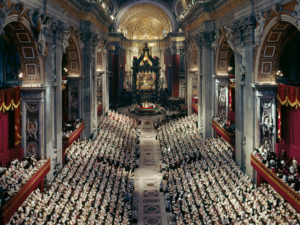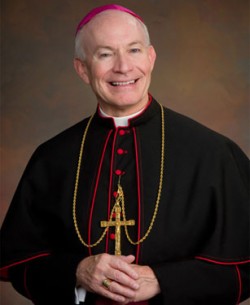Podcast: Play in new window | Download (Duration: 33:05 — 22.8MB) | Embed
Subscribe: Apple Podcasts | Spotify | Amazon Music | Android | Pandora | iHeartRadio | JioSaavn | Podchaser | Gaana | Podcast Index | Email | TuneIn | Deezer | Anghami | RSS | More

Episode 19 Vatican II – Constitution on the Sacred Liturgy pt. 2 – Why it Matters: An Exploration of Faith with Archbishop George Lucas
In this episode with Archbishop Lucas, we continue our conversation on the Constitution on the Sacred Liturgy.
Sacrosanctum Concilium, the Constitution on the Sacred Liturgy, is one of the constitutions of the Second Vatican Council. It was approved by the assembled bishops by a vote of 2,147 to 4 and promulgated by Pope Paul VI on 4 December 1963. The title is taken from the opening lines of the document and means “this Sacred Council”.
An excerpt from Sacrosanctum Concilium:
2. For the liturgy, “through which the work of our redemption is accomplished,” [1] most of all in the divine sacrifice of the Eucharist, is the outstanding means whereby the faithful may express in their lives, and manifest to others, the mystery of Christ and the real nature of the true Church. It is of the essence of the Church that she be both human and divine, visible and yet invisibly equipped, eager to act and yet intent on contemplation, present in this world and yet not at home in it; and she is all these things in such wise that in her the human is directed and subordinated to the divine, the visible likewise to the invisible, action to contemplation, and this present world to that city yet to come, which we seek [2]. While the liturgy daily builds up those who are within into a holy temple of the Lord, into a dwelling place for God in the Spirit [3], to the mature measure of the fullness of Christ [4], at the same time it marvelously strengthens their power to preach Christ, and thus shows forth the Church to those who are outside as a sign lifted up among the nations [5] under which the scattered children of God may be gathered together [6], until there is one sheepfold and one shepherd [7].
Also:
10. Nevertheless the liturgy is the summit toward which the activity of the Church is directed; at the same time it is the font from which all her power flows. For the aim and object of apostolic works is that all who are made sons of God by faith and baptism should come together to praise God in the midst of His Church, to take part in the sacrifice, and to eat the Lord’s supper.
The liturgy in its turn moves the faithful, filled with “the paschal sacraments,” to be “one in holiness” [26]; it prays that “they may hold fast in their lives to what they have grasped by their faith” [27]; the renewal in the Eucharist of the covenant between the Lord and man draws the faithful into the compelling love of Christ and sets them on fire. From the liturgy, therefore, and especially from the Eucharist, as from a font, grace is poured forth upon us; and the sanctification of men in Christ and the glorification of God, to which all other activities of the Church are directed as toward their end, is achieved in the most efficacious possible way.

For the documents of Vatican II visit here
For more episodes in this series visit the


